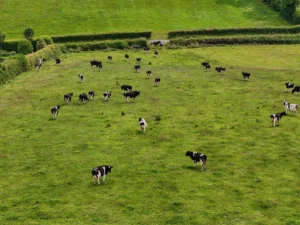
Cattle, greenhouse gases and the case for better methane metrics
Why the global warming potential of methane emissions from cattle production needs a closer look
Brazil is the world’s top exporter of beef and is also home to the largest tropical rainforest on Earth. These facts put Brazilian cattle ranchers at the center of some of today’s most urgent global questions: Can Brazil increase its meat production without encroaching on the Amazon? And if cattle ranching is tied to 80% of deforestation in the Amazon, how can we separate the illegal clearing of land from the producers who are striving to work within Brazil’s strict land-use laws?
Too often, these discussions take place in global forums that don’t make space for the voices of ranchers themselves to be heard. So, as climate leaders gather at major global climate events this year, Brazilian farmers are calling for a seat at the table.
Below, we unpack five questions about cattle ranching in Brazil that warrant a closer look as part of these important conversations. World Without Cows Brazil: The Battle for Balance, a new mini documentary from the filmmakers of World Without Cows, takes these questions further, exploring the people, policies and pastures shaping the future of sustainable beef production.
Deforestation is real, unacceptable and illegal where it occurs — but linking all Brazilian beef to the decimation of the Amazon is like blaming all of U.S. agriculture for California wildfires. In both cases, broad blame obscures the real drivers (e.g., illegal land-grabbing in Brazil and water-intensive cropping in California) while ignoring the producers who are working within the law.
According to recent audits, between beef and Amazonian deforestation. And certification initiatives — such as the Rainforest Alliance, the Brazilian Roundtable on Sustainable Livestock (GTPS) and biome-specific monitoring systems — show that deforestation-free beef is already available from verified supply chains. Many of these programs are active in regions like the Cerrado and Pantanal, where pastures and monitoring systems are more established.
It’s also important to note that the majority of recent deforestation in the Amazon isn’t linked to legal beef production at all. It’s tied to land-grabbers operating illegally on public lands. By some estimates, around 90% of forest loss in the Amazon occurs without authorization. Treating all ranchers as deforesters undermines any attempts at accountability — and any incentives for compliance.
About 80% of Brazilian beef is produced on pasture, which is an unusually high share in today’s global market.
This matters for two reasons. First, Brazil’s pasture-based systems are evolving in ways that directly affect emissions from cattle. Better-managed grasslands can shorten the time cows spend on pasture and, at the same time, store more carbon in the soil, helping to offset the carbon footprint of cattle.
Second, these systems support regenerative grazing, soil restoration and the production of nutrient-rich animal protein while requiring fewer outside inputs.
Calls for consumer boycotts of Brazilian beef are not uncommon in Europe and North America, but evidence suggests that they rarely reduce illegal deforestation. What they do instead is disrupt regulated supply chains and put pressure on the smallholders and certified producers who are already complying with the law.
A 2025 Reuters investigation into Brazil’s TAC da Carne agreement found that only 4% of supply chains under audit showed irregularities, compared to 52% among unaudited suppliers. This proves that traceability and enforcement drive measurable reductions in deforestation risk, while blanket boycotts do not.
Similarly, divesting from Brazilian beef might reduce investors’ exposure to the issues, but it doesn’t actually help stop deforestation.
The idea that Brazil must deforest to grow its beef sector is grossly outdated.
In April 2024, the Brazilian Ministry of Agriculture and Livestock (MAPA) announced the National Program for the Conversion of Degraded Pastures (PNCPD), which aims to convert 40 million hectares of degraded pasture into sustainable agricultural, forestry and livestock systems that could double the country’s farm output — without expanding into forests.
Pasture intensification, rotational grazing and low-carbon livestock practices are already helping producers expand without committing deforestation. But these stories aren’t shared as often — and the global community needs to hear more of them.
The loudest voices shaping the international image of Brazilian beef often come from outside Brazil. Whether it’s Western NGOs, advocacy media or protectionist trade blocs, the result is an ethical narrative that flattens regional nuances and excludes producers, Indigenous communities and rural workers from the table.
To compound this issue, the global conversation often overlooks the fact that Brazil has already enacted some of the strictest land-use laws in the world. Under the Forest Code, producers are legally required to preserve between 20–80% of their land as native forest, depending on the biome. In the Amazon, that means four out of five hectares must remain untouched. The Forest Code, however, is known by few outside Brazil, and fewer still understand the challenges of ensuring compliance with these laws.
For policymakers, this is not just about beef. It’s about how we build fair, climate-aligned trade systems that don’t rely on outdated assumptions. For consumer packaged goods (CPG) companies and sustainability officers, this is a call to reevaluate procurement strategies and to partner with suppliers who are already doing the hard work of transitioning away from the old ways. For Brazilian producers, it’s an opportunity for their progress to be acknowledged rather than overlooked in global debates.
Now is the time to challenge perceptions and engage with the full complexity of Brazil’s role in feeding the world while protecting its forests. Will global climate debates finally make space for the full story of Brazilian beef?
Meet the ranchers shaping a more sustainable future in our new mini-documentary, World Without Cows Brazil: The Battle for Balance.

Why the global warming potential of methane emissions from cattle production needs a closer look
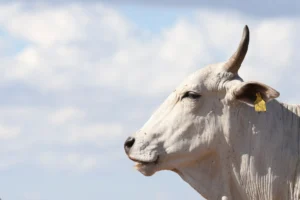
At COP30, the world’s eyes are on Brazil, and the cattle ranchers leading a global transformation.
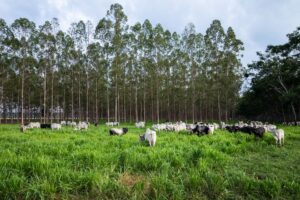
Restoring 40 million hectares of pasture could feed billions and ease pressure on the Amazon. Is the world paying attention?
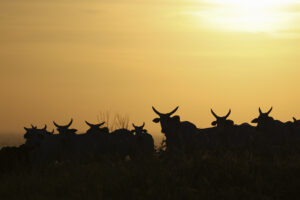
New mini-doc explores deforestation, food security and the Brazilian cattle sector’s path to a more sustainable future
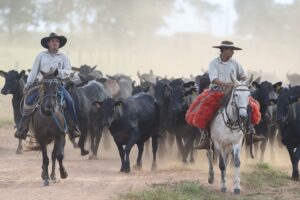
Mention Brazilian beef, and you’re likely to spark discussion about familiar themes: deforestation, emissions and blame. What do we find when we dig deeper? Here are the answers to five top questions about Brazil’s role in protecting the Amazon and feeding the world.
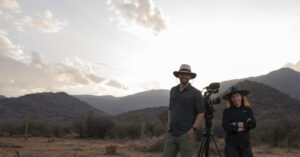
From science to the big screen: Discover how a single question grew into a global journey.
Receive notifications about the release date, new online content and how you can get involved